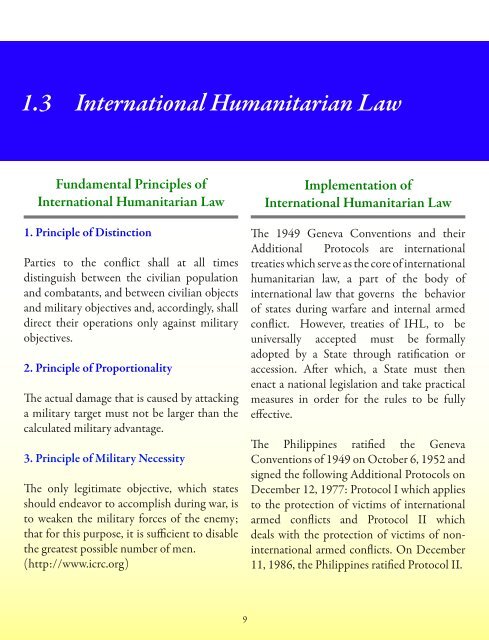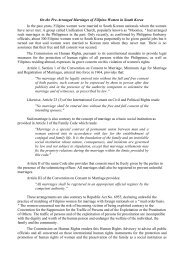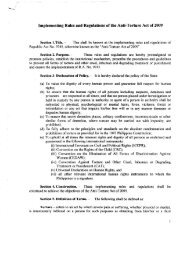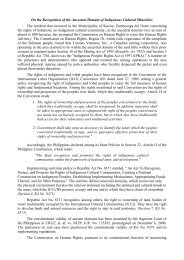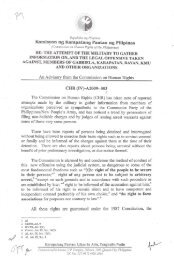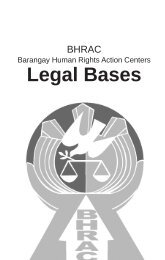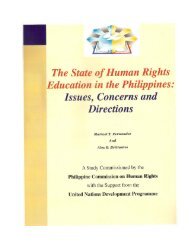Human Rights-Based Intelligence Operations - Commission on ...
Human Rights-Based Intelligence Operations - Commission on ...
Human Rights-Based Intelligence Operations - Commission on ...
You also want an ePaper? Increase the reach of your titles
YUMPU automatically turns print PDFs into web optimized ePapers that Google loves.
1.3 Internati<strong>on</strong>al <str<strong>on</strong>g>Human</str<strong>on</strong>g>itarian Law<br />
Fundamental Principles of<br />
Internati<strong>on</strong>al <str<strong>on</strong>g>Human</str<strong>on</strong>g>itarian Law<br />
1. Principle of Distincti<strong>on</strong><br />
Parties to the c<strong>on</strong>flict shall at all times<br />
distinguish between the civilian populati<strong>on</strong><br />
and combatants, and between civilian objects<br />
and military objectives and, accordingly, shall<br />
direct their operati<strong>on</strong>s <strong>on</strong>ly against military<br />
objectives.<br />
2. Principle of Proporti<strong>on</strong>ality<br />
The actual damage that is caused by attacking<br />
a military target must not be larger than the<br />
calculated military advantage.<br />
3. Principle of Military Necessity<br />
The <strong>on</strong>ly legitimate objective, which states<br />
should endeavor to accomplish during war, is<br />
to weaken the military forces of the enemy;<br />
that for this purpose, it is sufficient to disable<br />
the greatest possible number of men.<br />
(http://www.icrc.org)<br />
Implementati<strong>on</strong> of<br />
Internati<strong>on</strong>al <str<strong>on</strong>g>Human</str<strong>on</strong>g>itarian Law<br />
The 1949 Geneva C<strong>on</strong>venti<strong>on</strong>s and their<br />
Additi<strong>on</strong>al Protocols are internati<strong>on</strong>al<br />
treaties which serve as the core of internati<strong>on</strong>al<br />
humanitarian law, a part of the body of<br />
internati<strong>on</strong>al law that governs the behavior<br />
of states during warfare and internal armed<br />
c<strong>on</strong>flict. However, treaties of IHL, to be<br />
universally accepted must be formally<br />
adopted by a State through ratificati<strong>on</strong> or<br />
accessi<strong>on</strong>. After which, a State must then<br />
enact a nati<strong>on</strong>al legislati<strong>on</strong> and take practical<br />
measures in order for the rules to be fully<br />
effective.<br />
The Philippines ratified the Geneva<br />
C<strong>on</strong>venti<strong>on</strong>s of 1949 <strong>on</strong> October 6, 1952 and<br />
signed the following Additi<strong>on</strong>al Protocols <strong>on</strong><br />
December 12, 1977: Protocol I which applies<br />
to the protecti<strong>on</strong> of victims of internati<strong>on</strong>al<br />
armed c<strong>on</strong>flicts and Protocol II which<br />
deals with the protecti<strong>on</strong> of victims of n<strong>on</strong>internati<strong>on</strong>al<br />
armed c<strong>on</strong>flicts. On December<br />
11, 1986, the Philippines ratified Protocol II.<br />
9


